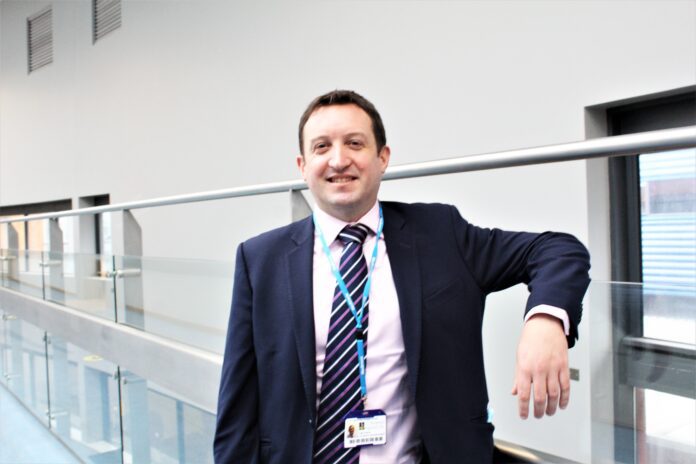
UL Hospitals Group colorectal and general surgeon Colin Peirce recently had the honour of delivering an online Grand Rounds presentation on his practice and research for one of the world’s most prestigious healthcare organisations, The Mayo Clinic.
Mr Peirce was invited as an exemplar of clinical practice and research, whose Grand Rounds presentation on his career would have beneficial lessons for residents (trainees) currently based in the famous US healthcare organisation.
“Grand Rounds” is the name given to presentations by experienced physicians to an audience drawn from the entire medical professional community within an institution, and Mr Peirce’s Grand Rounds presentation for the Mayo Clinic was entitled, ‘Rats, Randomised Trials, Robots and Resections: A Surgical Journey’.
“It was a very great honour to deliver this Grand Rounds presentation,” Mr Peirce said. “I went through my career to date, showing the residents how a career can develop, and what can be achieved, firstly in the laboratory, and then in the clinical context, with new technology and innovations in practice.”
Mr Peirce, a native of Crecora, County Limerick, was appointed to UL Hospitals Group as a Consultant Colorectal and General Surgeon in November 2016. He is best known in this region for his work on the pioneering robotics team who use the Da Vinci Xi Dual Console robot to perform colorectal surgery, delivering innovative surgical options for patients in the Mid West.
Prior to his appointment to the Group, Mr Peirce completed a 12-month international fellowship in the world-renowned Cleveland Clinic, Ohio, with a strong focus on robotic colorectal surgery. In late 2021, Mr Peirce and the Robotic Colorectal Team at UHL made a breakthrough for treatment of early stage bowel cancer in this country by performing the first robotic Trans-Anal Minimally Invasive Surgery (TAMIS) operation in Ireland.
Such career highlights made for an active Q&A session from the Mayo Clinic trainees, who were particularly interested in Mr Peirce’s research. He has been a keen contributor to surgical literature and has received both national and international awards and accolades for his research.
One specific area of research interest for Mr Peirce has been surgical site infection (SSI), or the infection of wounds during the healing process after surgery. As a trainee in UHL, he designed and ran a trial applying negative pressure wound therapy dressings to surgical wounds, and this approach significantly reduced the infection rate. This trial, The PICO trial, which generated debate internationally, led to further research, and the use of the dressing has become recommended worldwide.
“I set out to give the residents an insight into what can be achieved in the laboratory, and then applying this knowledge in the clinical context. We had a great discussion about clinical trials, and the challenges in getting these set up, but also about the primacy of the ultimate goal, and that’s obtaining data that is meaningful in the everyday context, and is potentially practice-changing,” he said.
“It was very exciting as a surgeon to be involved in research that has gone on to change practice for the better across the world. I’m also very honoured to have been chosen to deliver this Grand Rounds presentation to give the Mayo Clinic trainees an insight into bridging research and everyday life, and delivering improved options and outcomes for patients,” Mr Peirce said.
Mr Peirce’s Grand Rounds for The Mayo Clinic comes within a year of his being chosen to deliver the 43rd annual Millin Lecture, one of the most prestigious events in the calendar of the Royal College of Surgeons in Ireland (RCSI).










